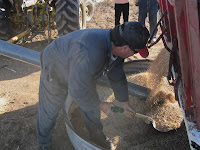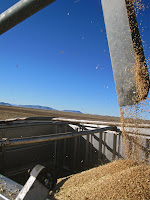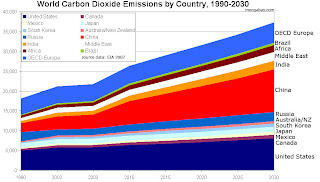Some Shipibo children enter my slow day dream, their voices quiet and curious. They look with large questioning and loving eyes, they touch with small and shy chuckles.....my blond hair is still a novelty.
They don't even fathom how they are bestowing gift upon gift so freely, every smile penetrating into the convoluted web of damaged relationships that is me, and slowly putting me back together, healing me inside. Forced to understand my humanity in their light, despite of being white, despite being born into privilege compared to them, suddenly I realize that my wholeness depends upon my capacity to identify with them --not just in this moment, but in one's actions, in one's practice. Compassion, equality, communion, even enlightenment, they are just words, unless they are practiced -- they require bringing awareness to our way of live, our investments, our consumption, our (political) choices--our every move, and understand our impact on the global system.
If you are a buddhist, or if you want to walk any spiritual path for that matter, now is the time to realize that the children of the 3rd world, the poorest of the poor, are our teachers, and 'letting go' must be our path. As my dharma brother Baker Roshi once said in a lucid moment:"....detachment is our biggest gift....". We have to let go of what we are supposed to be (our families expectations and the endless barrage of media imagery and propaganda telling us who we are supposed to be), to become who we are. We are not the selfish, diminished, damaged charicatures that inhabit the census of capitalist' relations and the scorecard of rich versus poor. We are far more than that --we are equal humans beings, born naked on this earth, and paradoxically, we need each other to fully manifest ourselves. We are cut from one spirit and we breath the same air.
My attention turns back to the children. They embark a hollowed out tree trunk to go fishing in their still pristine lake, a far branch of what eventually becomes the great Amazon. In the current scheme of things:
At best their land will be monetized as a carbon off-set (so that someone else can pollute elsewhere) - at worst their lake will become another oil well. In either case they may have to move. This is the reality of one dimensional Capitalism.
These Shipibo children don't know that their fate is decided in Washington and in Wallstreet and in the offices of Climate Negotiations on Cap and Trade, such as just happened in Copenhagen. Their fate depends on how we in the developed world see ourselves....our willingness to share the earth's abundance realistically. That was really what was on the table in Copenhagen. We need to evaluate what these children are offering us, without exacting a price, fiscally or in climate debt. I am not talking just in economic terms here: They are the link to our original humanity, our authentic being, they are the caretakers of the forest, the garden. Tell me, at this point: what is that worth ?
And there is one more thing I want to say. People in the developed world often think that ultimately our problem is one of overpopulation --and who can't agree that there are too many of us ? Yet I would like to bring some sophistication to this notion.
As I mentioned before, Junin Pablo, the village deep in the Peruvian Amazon counts about 700 Shipibo and probably over 40% of those are children, at least 300 or so. The Shaman himself has at least 7 we know of. The Shipibo still enjoy making children (and no condoms around) and see children as the ultimate gift of Patcha Mama, the green, breathing & damp, pulsating and undulating, the hot moist 'Ronin Dragone', the magical snake singing everything into existence.
That is Great ! But looking at that a little longer we sober Dutch folk say:"WAIT ....that is too many children --that is bad for the future of our planet.." And that is true too.

Katya in the rain forest
Bon visiting her chinese friend Bobo with Bobo's
Dutch mother Suzan in Amsterdam
I think back of that moment in the forest, closing in on the faces of the Shipibo jungle children and then my own one daughter comes into focus. See how responsible ? -- I don't have 7 children --only one. She just turned 16 now.
Like all other parents we have tried to give our child the best. In her case that means that she has attended private and special education and has already travelled in Asia, Europe, Mexico and within the US itself with extensive stays in the Netherlands, in Bali, in France, Italy, Nepal, Mexico, Japan, New York, California, etc. All meant to give her a global awareness.
Then there is an even more sobering thought: my own one daughter whom I love and adore, already used up more resources, more 'carbon credits' --then all the children in that Shipibo village Junin Pablo will most likely use over their whole live times combined. And I am not even talking about myself and my carbon footprint....
What I am trying to get at here, is that it is not just a question of climate change or overpopulation or carbon. What humanity is facing is a question of justice and equality and solidarity. That involves all of us. It actually does....question the American way of live... and that should be on the table....
This is my Xmas message 2009 and my wish for 2010: Happiness to all,
Willem Malten
Here are some videos with the Shipibo kids. In the first clip you'll see their Junin Pablo school with shaman Pancho Mahua thinking aloud about the role of Shipibo traditions and language in modern education and in the second one, our young friends go fishing in their abundant lake.
By the way --if you double click the pictures above (or anywhere in the vortex blog) they will enlarge. Enjoy.




































